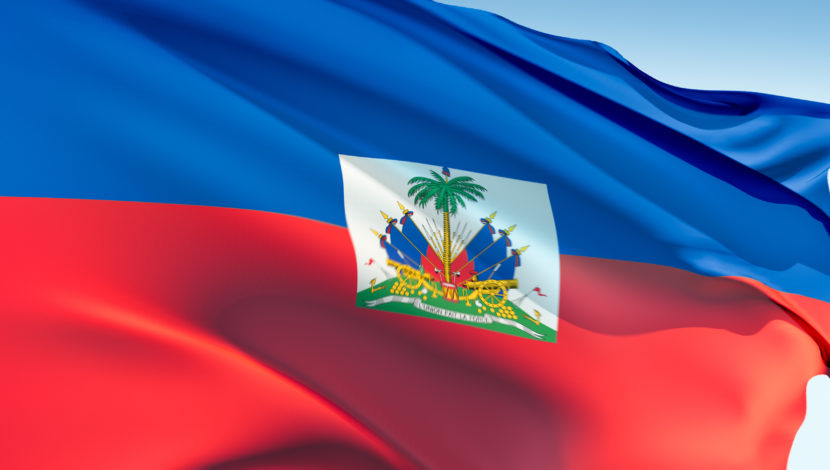The Unitarian Universalist Service Committee advances human rights through grassroots collaborations.
One Year After Assassination, U.S. Still Blocking Haitian Democracy

By UUSC Staff on July 8, 2022
Just a little over a year ago, dozens of armed men broke into the compound of Haitian President Jovenel Moïse—meeting a suspicious lack of resistance from the president’s security forces—and opened fire on Moïse and the first lady in their own home. Moïse, who was shot more than 12 times, died instantly. His spouse, Martine Moïse, survived the encounter but was severely wounded.
The brutal assassination marked a new chapter in Haiti’s ongoing political crisis, but hardly the first. Before his death, Moïse had presided over a spike in gang warfare that enabled armed criminal networks to seize control of large parts of the country and inflict a wave of kidnapping, extortion and sexual violence on ordinary Haitians that continues to the present. Meanwhile, Moïse himself was moving to consolidate power in autocratic fashion. In the final months of his presidency, Moïse repeatedly delayed elections, sought to prolong his term in office, and governed by decree—effectively suspending democratic procedures and ruling as a strongman.
During the close of his presidency—even as Haiti’s security and political situation worsened—the United States continued to back Moïse’s government. If nothing else, his murder should have led them to reassess this strategy. It provided yet another reminder of a lesson repeated throughout Haiti’s history: Foreign interference in support of unelected strongmen is the cause of—not the solution to—the country’s political problems. Moreover, Haitian civil society presented a clear alternative choice. In a comprehensive plan known as the Montana Accord, a broad cross-section of Haitian organizations representing every sector of civil society laid out a proposal for a two-year transition that would end the country’s political crisis and restore Haitian democracy.
But instead of changing course and backing this plan to support Haitian democracy, U.S. leaders and other Global North powers issued a joint statement recognizing Moïse’s handpicked successor, Ariel Henry, as the country’s leader and effectively installing him in power. U.S. support for Henry has continued even as he has been credibly linked to the assassination plot against Moïse, the man who appointed him, as well as to various armed criminal groups terrorizing the country. According to a former official who oversaw the since-stymied criminal investigation into Moïse’s murder, Henry should be a “prime suspect” in the conspiracy, and phone records proved that he was in contact with a likely co-conspirator in the assassination within hours of the killing.
In the year since he took power, Henry has ruled without a democratic mandate, repeatedly delaying elections and sidelining Haitian civil society. Meanwhile, Haiti’s security problems have gone from bad to worse, with criminal networks seizing and occupying the country’s main seat of justice. This deteriorating crisis was made possible by Henry’s consolidation of power and the lack of a Haitian-led democratic process; yet it conveniently serves as a pretext for Henry to delay elections and hold on to power even longer. (The grave humanitarian situation in Haiti also has not stopped U.S. leadership from forcibly expelling more than 26,000 Haitian refugees to the island without an asylum hearing, in violation of international law.)
U.S. support for Henry—and unwillingness to back the Montana Accords as a Haitian-led solution to the crisis—replicates a pattern Haitians have seen all too many times before. Throughout the country’s history, foreign powers from the Global North have blocked Haitian democracy in order to extract wealth and labor from the country’s people. In the 19th century, the former enslaving power France compelled Haiti to pay ruinous fees, in “compensation” for the fictitious wealth they claimed to have possessed through owning human beings. In the 20th century, the United States similarly invaded Haiti and forcibly expropriated half a million dollars in gold from the Haitian people, transferring the funds to a U.S. bank. In 2004—after Haitian President Jean-Bertrand Aristide took steps to prepare a legal case to seek repayment of this stolen wealth, France and the United States conspired to stage a coup d’état and overthrow Haitian democracy.
Disgraceful as this history is, there is no reason why the United States should repeat it yet again. U.S. leaders do not have to back autocratic rule at the expense of Haitian civil society, nor continue to expel Haitian refugees to a country in crisis. UUSC’s partners, as members of the Commission for Haitian Solution to the Crisis, have helped develop the Montana Accord that lays out a clear path in Haiti to restore democracy and end the political crisis. All the United States needs to do is to finally get out of the Haitian people’s way.
You can help achieve this outcome by adding your name to our coalition’s joint petition to U.S. leadership. You can also read more about our Haitian partners’ analysis and demands in detail at our coalition sign-on letter for organizations. Help us tell President Biden, Secretary of State Blinken, and other key decision-makers to stop interfering in Haitian democracy and stop supporting puppet dictators at the expense of Haiti’s future. Instead of meddling in our neighboring republic, it’s past time to let the Haitian people claim the future they deserve. Add your name to help us send this message today.
Photo Credit—iStock: bkindler

